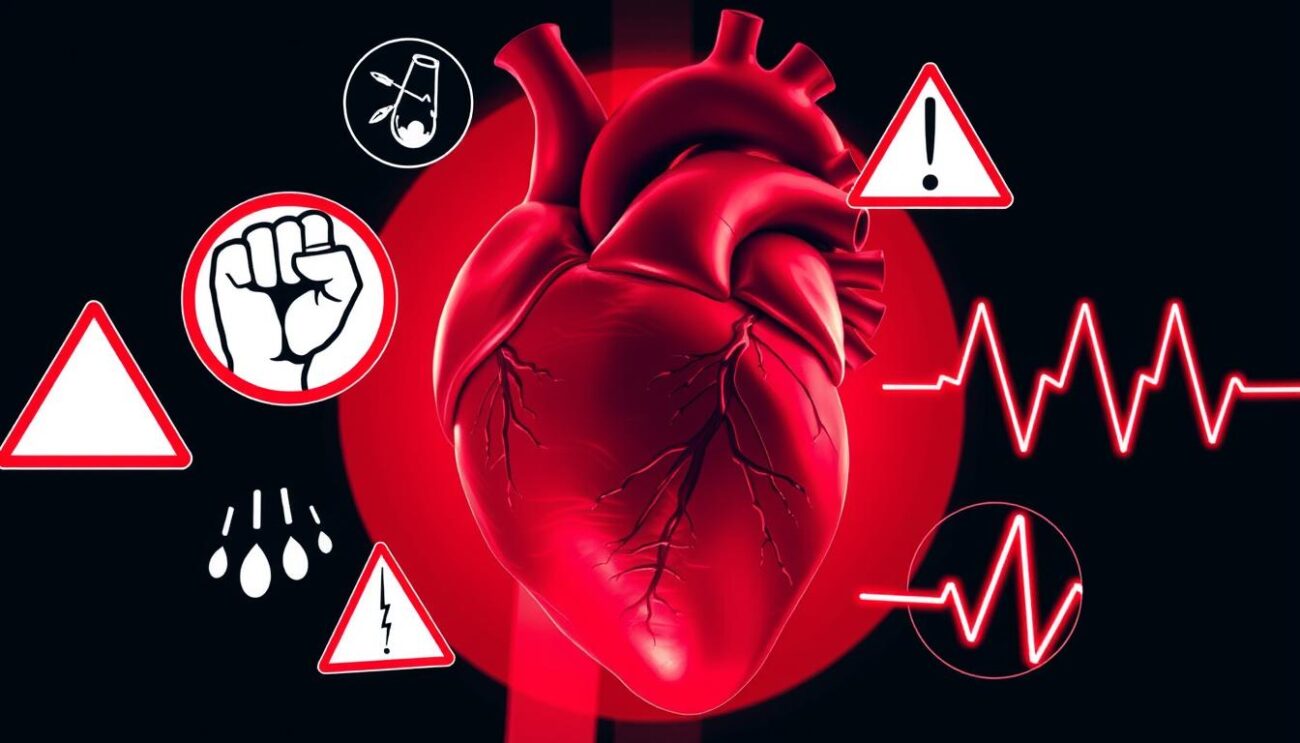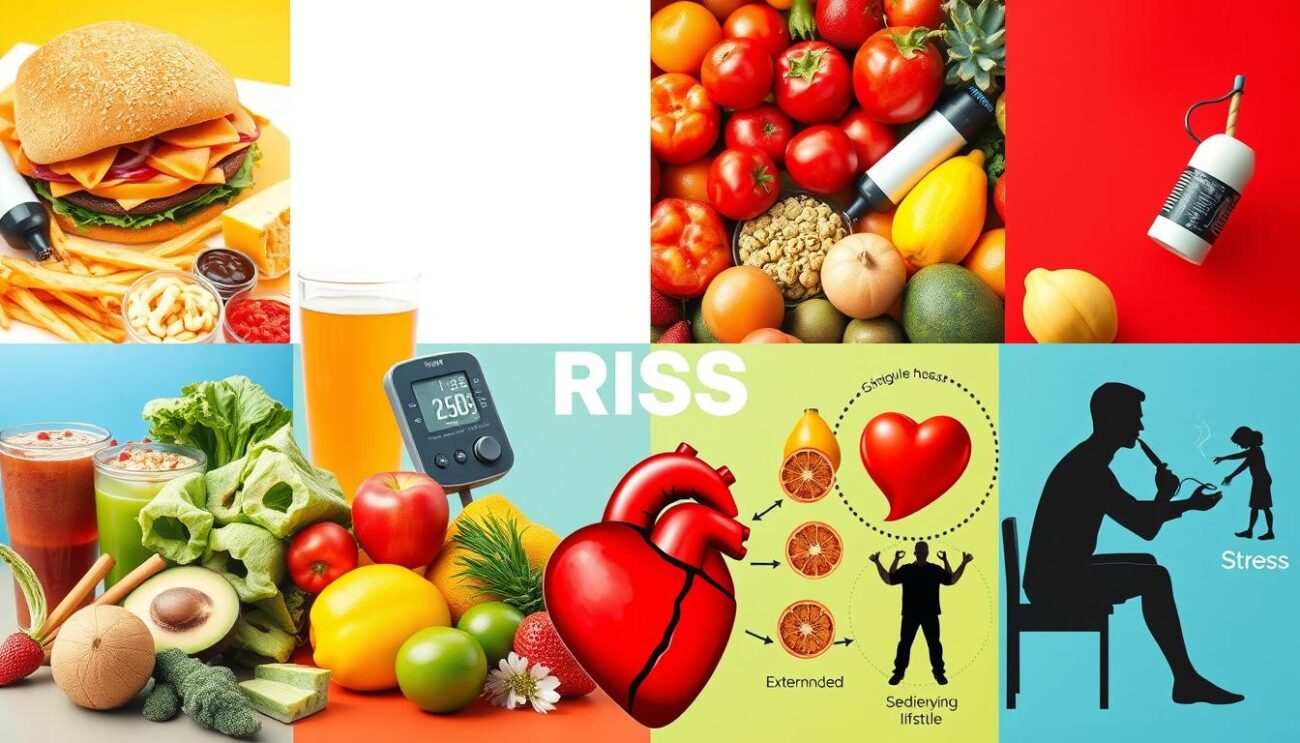Are you ready to take control of your heart health? A heart-healthy diet can help lower your risk of heart disease. It also boosts your overall health. But, where do you start? Let’s explore simple ways to feed your body right and keep your heart safe.
Key Takeaways
- Adopt a balanced nutrition plan that emphasizes plant-based foods, whole grains, and lean proteins.
- Incorporate regular physical activity to maintain a healthy weight and support cardiovascular function.
- Limit intake of saturated and trans fats, sodium, and added sugars to support heart health.
- Read food labels and make informed choices to ensure you’re fueling your body with nutrient-dense, heart-healthy options.
- Consult with healthcare professionals to create a personalized plan that aligns with your individual health needs and preferences.
The Importance of a Heart-Healthy Diet
Eating a balanced diet is key to avoiding heart disease, the top killer globally. A diet full of fruits, veggies, whole grains, lean proteins, and healthy fats helps. It lowers cholesterol, blood pressure, and inflammation, all heart disease risk factors.
Reducing the Risk of Cardiovascular Disease
A diet good for the heart can greatly cut down heart disease risk. It’s important to keep saturated fats under 7% of daily calories. The average American eats too much sodium, about 4,000 milligrams a day, double the suggested amount.
People at higher risk, like African-Americans and those with high blood pressure, should eat less than 1,500 milligrams of sodium daily.
Promoting Overall Wellness and Longevity
A heart-healthy diet does more than just lower heart disease risk. It boosts overall health and can help you live longer. It helps keep a healthy weight, strengthens the immune system, and lowers the chance of diabetes and some cancers.
Eating a variety of fruits, veggies, whole grains, lean proteins, and healthy fats gives you the nutrients and antioxidants you need. This supports your health and well-being.
“A heart-healthy diet could incorporate up to 35% of calories from fats, mainly from mono- and polyunsaturated fats, with a maximum of 78 grams of fat for a 2,000-calorie diet.”
Balancing Calorie Intake and Physical Activity
Keeping a healthy weight is key for heart health. It’s all about balancing the calories you eat and the ones you burn through exercise. Knowing your daily caloric needs helps you set the right calorie goal. This depends on your age, gender, and how active you are.
Understanding Daily Caloric Needs
Your daily calorie needs change with age and activity level. As you get older, your body burns fewer calories. To stay healthy, aim for at least 150 minutes of moderate activity or 75 minutes of vigorous activity each week. This helps burn calories and boosts heart health.
Incorporating Regular Exercise
- Aim for at least 150 minutes of moderate activity or 75 minutes of vigorous activity per week to support heart health and weight management.
- Choose activities you enjoy, such as brisk walking, swimming, or cycling, to make exercise a sustainable part of your lifestyle.
- Consult with a healthcare professional to develop a personalized exercise plan that aligns with your fitness level and goals.
By knowing your daily calorie needs and exercising regularly, you can find the perfect calorie balance. This supports a healthy weight and improves your heart health.
“Regular physical activity is essential for maintaining a healthy weight and supporting cardiovascular health. Incorporating a variety of exercises into your routine can help you achieve the recommended activity levels and reap the benefits for your heart.”
Embracing Plant-Based Nutrition
A heart-healthy diet focuses on fruits and vegetables. They are full of vitamins, minerals, and antioxidants that are good for your heart. Whole grains like brown rice, oats, and quinoa are also key. They offer a fiber-rich base that helps lower cholesterol and keep blood sugar levels healthy.
Adding more plant-based foods to your diet can replace unhealthy, processed foods. This brings in a lot of nutrient-dense nutrients that protect your heart.
Fruits and Vegetables: Nutrient Powerhouses
Fruits and vegetables are the heart of a plant-based diet. They are full of vitamins, minerals, and antioxidants. These can lower the risk of heart disease, cancer, and other chronic conditions.
Try to eat a variety of fruits and vegetables in different colors. Each color offers unique health benefits.
Whole Grains: A Fiber-Rich Foundation
Whole grains are essential for heart health. Foods like brown rice, oats, quinoa, and whole wheat bread are tasty and good for you. They help lower cholesterol, regulate blood sugar, and keep you feeling full.
Choosing whole grains over refined options is a big step towards a healthier heart.
“Eating a plant-based diet can significantly reduce the risk of heart disease, the leading cause of death worldwide.”
By choosing a plant-based diet rich in fruits, vegetables, and whole grains, you nourish your body. These nutrient-dense foods support overall health and well-being. Emphasizing these wholesome, fiber-rich options helps you reach your heart-healthy goals and enjoy a balanced, plant-based lifestyle.
heart-healthy diet recommendations
A heart-healthy diet focuses on lean proteins and plant-based options. Lean proteins like poultry, fish, and legumes are good choices because they are low in saturated fat. Plant-based proteins, such as beans and tofu, add fiber and nutrients without cholesterol.
It’s also key to include healthy fats and omega-3s in your diet. Foods like olive oil, avocados, and fatty fish are great sources. They help lower bad fats and improve cholesterol, supporting heart health.
Emphasizing Lean Proteins and Plant-Based Sources
A heart-healthy diet should highlight lean proteins, such as:
- Poultry (chicken, turkey)
- Fish (salmon, tuna, mackerel)
- Legumes (beans, lentils, peas)
- Soy-based products (tofu, tempeh, edamame)
Plant-based proteins are also beneficial. They offer fiber and nutrients without cholesterol. Examples include:
- Beans
- Lentils
- Nuts and seeds
- Quinoa
- Tofu and tempeh
Incorporating Healthy Fats and Omega-3s
Healthy fats and omega-3s are crucial for heart health. Good sources include:
- Olive oil
- Avocados
- Nuts (almonds, walnuts, pecans)
- Fatty fish (salmon, mackerel, sardines)
These fats and omega-3s help lower bad fats and improve cholesterol. They support heart health.
“A heart-healthy diet is not about deprivation; it’s about making informed choices that nourish your body and support your long-term well-being.”
By focusing on lean proteins, plant-based options, and healthy fats, you can create a diet that’s good for your heart. It also supports overall health and longevity.
Healthline offers detailed guidance on heart-healthy diets. It helps you make better choices for your health.
Limiting Sodium and Added Sugars
Keeping your heart healthy is more than just counting calories and exercising. It’s also about cutting down on sodium and added sugars. Too much of these can harm your heart. So, it’s key to know how to control their intake.
Reading Food Labels for Sodium Content
Lowering your sodium is crucial for heart health. The daily limit is 2,300 milligrams (mg) or 1,500 mg if you have hypertension. By reading labels and picking low-sodium foods, you can stay within safe limits.
- Look at the sodium per serving on the Nutrition Facts label.
- Choose foods with less than 140 mg of sodium per serving. Aim for even lower if you can.
- Watch out for processed, canned, and restaurant foods, as they often have high sodium.
Reducing Sugary Beverages and Sweets
Added sugars are also bad for your heart. The Dietary Guidelines say added sugars should be less than 10% of your daily calories. Drinks and sweets are big sources of added sugars, so cut back on them.
- Switch sugary drinks like soda, juice, and sweetened coffee for water, unsweetened tea, or low-fat milk.
- Get your sweet fix with fresh fruits, which are full of fiber and low in added sugars.
- Watch out for hidden added sugars in condiments, baked goods, and processed snacks.
By choosing to eat less sodium and added sugar, you’re moving towards a heart-healthy diet. This can help lower your risk of heart disease.

“Limiting sodium and added sugars is a critical component of a heart-healthy lifestyle. By reading labels and making smart choices, you can support your cardiovascular well-being.”
Choosing Healthy Fats and Oils
Choosing the right fats is key to a heart-healthy diet. Experts say to focus on unsaturated fats. These are found in olive oil, canola oil, avocados, and nuts. On the other hand, limit saturated fats and trans fats as they can harm your heart.
Switching to healthier monounsaturated and polyunsaturated fats can greatly benefit your heart. Monounsaturated fats can improve your blood cholesterol levels. Meanwhile, polyunsaturated fats can lower bad cholesterol (LDL).
Omega-3 fatty acids are also good for your heart. They help prevent blood clots and lower stroke risk. Eating foods rich in omega-3s, like fatty fish, is a smart choice for your diet.
| Healthy Fats | Unhealthy Fats |
|---|---|
| Monounsaturated Fats Polyunsaturated Fats Omega-3 Fatty Acids |
Saturated Fats Trans Fats |
Switching to heart-healthy oils and adding more unsaturated fats to your diet can greatly improve your heart health. It also lowers your risk of heart disease.
“The type of fat consumed is more important than the amount of fat in the diet.”
Portion Control and Mindful Eating
Controlling your portion sizes and eating mindfully are key to a heart-healthy diet. By setting achievable goals and enjoying each bite, you can make lasting changes. These changes can help you lose weight, improve heart health, and feel better overall.
Strategies for Proper Portion Sizes
Using smaller plates is a good way to control portion sizes. It tricks your mind into thinking you have more food. Also, eating slowly and listening to your hunger cues can stop you from eating too much.
- Use smaller plates to create the illusion of a larger portion
- Eat slowly and savor each bite to allow your body to register when it’s full
- Avoid distractions like TV, phones, or computers during meals to stay mindful
- Measure your food portions to ensure you’re not exceeding your daily caloric needs
- Consider halving your portions to reduce calorie intake without feeling deprived
Mindful Eating: Savoring Every Bite
Mindful eating focuses on the taste, texture, and smell of your food. It makes meals more enjoyable and supports your health. By staying present and avoiding distractions, you can make better food choices and enjoy a healthier relationship with food.
“Eating without distractions boosts enjoyment of food and leads to making healthier choices.”
| Mindful Eating Benefits | Mindless Eating Drawbacks |
|---|---|
| Increased satisfaction after meals | Reduced awareness of portion sizes |
| Slower eating rate | Association with overeating |
| Healthier food choices | Decreased enjoyment of food |
By using these portion control and mindful eating tips, you can reach your weight management goals. They also support your health and wellness.
Lifestyle Modifications for Heart Health
Keeping your heart healthy is more than just what you eat. It’s also about managing stress and avoiding bad habits like smoking and drinking too much. These changes can greatly lower your risk of heart disease and help you live longer.
Stress Management and Relaxation Techniques
Too much stress can harm your heart, raising blood pressure and causing inflammation. It’s vital to find ways to manage stress. Exercise regularly, practice mindfulness, and do things that make you feel good. These can help keep your heart healthy.
Avoiding Tobacco and Excessive Alcohol
Smoking is a big risk for heart disease, damaging blood vessels and increasing the chance of heart attack and stroke. Quitting smoking can greatly lower these risks, with benefits seen as soon as a year after quitting. Drinking too much alcohol also harms your heart, causing high blood pressure and irregular heartbeats. It’s important to drink in moderation to keep your heart healthy.
By making these lifestyle changes, you can boost the benefits of a heart-healthy diet. This comprehensive approach protects your heart and helps you live a longer, more vibrant life.
“Maintaining a healthy lifestyle is crucial for heart health, with stress management and avoiding harmful habits like tobacco and excessive alcohol being just as important as a balanced diet.”
Customizing Your Heart-Healthy Plan
While a heart-healthy lifestyle is good for most, your personal needs matter too. This includes your health history, current health, and what you like to eat. Working with healthcare professionals like dietitians or cardiologists is key. They help craft a diet plan that fits you and is easy to keep up with, boosting your heart health.
Considering Individual Factors and Preferences
There’s no one diet that fits all when it comes to heart health. Your health history, current health, and food likes are all important. With help from healthcare pros, you can get a diet plan that meets your health needs and tastes. This makes it easier to follow and keep up with over time.
Working with Healthcare Professionals
Getting help from experts like dietitians or cardiologists is super helpful. They create a personalized diet plan based on your health and needs. This way, you get a heart-healthy lifestyle plan that fits your life. Working together, you make sure your diet plan is both good for your heart and easy to follow.
“Eating a heart-healthy diet can reduce your risk of cardiovascular disease by up to 94%, while a pill can only reduce that risk by 20-30%.”
Conclusion
Starting a heart-healthy diet is key to lowering your risk of cardiovascular disease. It helps you stay well overall. Focus on eating foods rich in nutrients, like plants, lean proteins, and healthy fats. Avoid too much sodium and sugar.
This diet can help your cholesterol, blood pressure, and inflammation. These are important for a healthy heart.
Adding a heart-healthy diet to your life can also help with other lifestyle changes. Regular exercise, managing stress, and not smoking or drinking too much alcohol are all good. These changes can greatly benefit your heart health and life span.
By making these changes, you can protect your heart and live a healthier life. It’s all about taking care of yourself and your heart.
Remember, a balanced diet and lifestyle are the keys to a healthy heart for life. Start nourishing your body and mind today. Begin your journey to better heart health and a longer life.







